
There are two types of discussions about HIV that take place in the gen-pop of Black communities. One, how Magic Johnson holds the cure or about the type of person who contracts this virus. Two is the rhetoric that this is a disease one contracts when dealing with a gay man or when gay. Neither dialogues are helpful in educating communities on HIV.
You'll hear many experts and advocates say that HIV is no longer a death sentence and while this is true, I imagine that none of us are flying a Goodyear blimp in the blue skies that says "come for me." No one asks for HIV. No one. Which makes it all the more important that we stay educated on the topic in a way that is sex positive.
Because despite the 14 million people who had to die due to the government's ignorance and bias throughout the 80s and well into the 90s, there always seems to be a new headline about an influx of HIV diagnosis in one black-ish community or another and part of me feels that has a lot to do with the way we've continuously stigmatized it. This can be easy to do when there isn't proper sex education within many communities. We're having too many of the wrong discussions and not enough of the right ones.
But I've never been one to sit around demanding change while refusing to be part of the solution, so let's chat! Let's debunk what you believe to be true about HIV and get the 411 on preventative measures, plus what a diagnosis means.
Human immunodeficiency virus is what those three often bolded letters stand for in the acronym HIV. According to Dr. Cedrina Calder, it hurts the immune system "by attacking specific cells. The virus affects the body's natural ability to fight infection." She warns, "If the virus is left untreated, the illness can progress to a condition called Acquired Immunodeficiency Syndrome or AIDS."
HIV can be detected by your gynecologist or urologist using one of the three methods: Nucleic Acid Test, Antigen test, or an Antibody test. Rapid and home tests are normally antibody tests that can be conducted with an oral swab or a blood sample. For those with a healthy suspicion of home test, like myself, Dr. Calder says they are 92 percent sensitive. In other words, it will be effective for about 92 percent of those who use it. The nucleic acid test is a more thorough test that doctors may opt for if you test positive.
Is There A Cure For HIV?

Getty Images
The origin of HIV has been a mystery for the most part. While the CDC suggests that it may have been present in Africa since the late 1800s, it didn't knowingly make its way to the United States until the late 1970s. When it first ravaged communities, it was thought to only be a disease that affected the gay community -- the name given to it during that time was Gay-Related Immune Deficiency (GRID).
It took thousands of people dying annually and a decade of activism from groups such as ACT UP for the Government to intervene and pass policy for FDA approved medications for the infection.
As it stands there is no cure for HIV, there are only treatments. These treatments have become increasingly more effective, increased life expectancy, and decreased the likelihood of HIV progressing to AIDS. As previously mentioned, these treatments make it possible to live a healthy life with an equally healthy sex life after being infected through consistency and maintaining a low detectability rate, making it more difficult to transmit the virus.
Exposure to HIV

Getty Images
It can't be stressed enough how important it is to be tested regularly for HIV. Your annual visit can suffice unless you engage in "risky" sexual behaviors, and then it is recommended that you get tested more frequently.
Risky sexual behavior doesn't necessarily mean engaging in sex with multiple partners but can simply mean you engage in anal sex regularly. According to Dr. Calder, those who participate in anal sex or are the proclaimed "bottom" are at greater risk due to how easy it is for the infection to pass through rectal tissue. This has to do with the lack of lubrication provided in the area, as well as the fact that the tissue there has a lot of blood vessels.
It's worth noting that HIV cannot be detected immediately after exposure and while it often takes anywhere from least three to 12 weeks, there are some cases where the antibodies take longer to detect.
That said, should you be exposed to HIV unknowingly (this might occur in the case of sexual assault), you have a 72-hour window to get to your doctor for PEP or Post-exposure Prophylaxis. If this occurs over a weekend or any given day where you cannot be seen by your physician, it is critical that you get to the ER to begin treatment.
Living with HIV is more than possible with technological advances, but it does require a shift in your lifestyle. In fact, Dr. Calder reminds us that although there is no guarantee that HIV won't develop into AIDs, with early and proper treatment along with a healthy lifestyle you can "significantly decrease the chance of the infection progressing into AIDs." She further elaborated that this healthy lifestyle might look like limiting alcohol and drug intake, fitness, and a generally clean diet.
HIV Today: Proactive PrEParation

Getty Images
If you are HIV-negative but currently engage or plan on engaging in sex with an HIV-positive partner, then Pre-Exposure Prophylaxis (or PrEP) is a pill regimented daily that helps to prevent the transmission of HIV. For those engaging in vaginal sex, the pill takes up to three weeks to work.
PrEP solely protects against HIV and it's not recommended that couples stop using condoms or other forms of birth control in lieu of taking PrEP. Furthermore, we know that there is no form of contraception that's 100 percent effective outside a laboratory but it can be 90 percent effective at reducing the risk of transmission through sex.
According to PrEP, the pill is also viable option for women who wish to become pregnant with their partner who is positive.
The Ryan White Care Act AIDS Drug Assistance Program has been around since 1990 and helps low-income people afford medications. And now, with the inclusion of Obama Care and the Affordable Care Act, these medications are more accessible than ever. At this juncture, Medicaid and most insurances cover the cost of the PrEP pill, but if you don't have access to those programs, there are organizations you can reach out to for financial assistance.
However, as Dr. Calder points out, it's these type of socioeconomic disparities that have continuously made HIV an epidemic amongst those who identify at the intersection of black, gay, and male.
It must be said that by perpetuating stereotypes, the groups impacted by any disease only become pushed further into the margins, making it more difficult to take preventative measures. Thus, why it's so important for us to have these discussions and create a safe space for people to address genuine concerns, correct misinformation, and further expound upon the dialogue.
Featured image by Getty Images.
Related Articles:
The Real Tea On HPV: The Most Common Sexually Transmitted Infection - Read More
7 Home Remedies That Can Help Cure Your Vaginal Infections - Read More
Watch Out For The Latest STD: "Something To Do" Relationships - Read More
- Living With HIV | HIV Basics | HIV/AIDS | CDC ›
- AIDS: homophobic and moralistic images of 1980s still haunt our ... ›
- HIV Stigma and Discrimination | AVERT ›
- Information on Non-reactive (Negativ)e HIV Test Results ›
- Life After an HIV Diagnosis: Getting Support and Medical Care ›
- Frequently Asked Questions - APRI ›
- HIV viral load: What it means, detection, and CD4 levels ›
- What does it mean to have HIV today? - Orlando Sentinel ›
- HIV and AIDS: Overview, causes, symptoms, and treatments ›
- Charlie Sheen's HIV Diagnosis: What HIV Means Today | Time ›
This Is How To Keep 'Holiday Season Stress' From Infecting Your Relationship
Hmph. Maybe it’s just me, but it seems like there is something really weird happening in the fall season air (because winter doesn’t officially begin until December 21) that cuddle season is in full swing while break-up season is as well. In fact, did you know that break-ups are so popular during the holiday season that December 11 is deemed Break-Up Day?
The reasons why relationships shift around this time vary; however, I did both roll my eyes and chuckle when I read that a very popular one is because it’s an easy way to get out of getting one’s significant other a Christmas present. SMDH.
Anyway, I personally think that the less shallow folks out here may contemplate calling things “quits” or they at least distance themselves a bit from their partner (and what I’m referring to is serious relationships) due to all of the stress and strain that oftentimes comes with the holidays whether it be financial, familial, due to their tight schedules or something else.
Listen, I would hate for you and your man to miss the fun and happiness of experiencing this time of year, all because you are so overwhelmed or irritated that you can’t really enjoy it. That’s why I have a few practical tips for how to avoid allowing the typical holiday season stress from INFECTING your relationship.
Manage Your Expectations
 Giphy
Giphy
Unmanaged expectations. If there is a main reason why the holiday season tends to be so stress-filled for so many people, I’d bet good money that this is the cause. And when you’re in a long-term relationship, expectations can manifest themselves in all sorts of cryptic and/or unexpected ways. You might have relatives who assume that you are going to be with them for Thanksgiving or Christmas when you have other plans in mind. You might be thinking that you are going to spend one amount for presents while your man is thinking something totally different. When it comes to scheduling, your signals may be crossed.
And you know what? To all of these scenarios, this is where clear and consistent communication come in. Don’t assume anything. Don’t dictate anything either. From now until New Year’s, mutually decide to check in once a week, just to make sure that you are both on the same page as it relates to the holidays and what you both are thinking will come along with it. The less blindsided you both feel, the less stressed out you will be. Trust me on this.
Set (and Keep) a Budget
 Giphy
Giphy
Okay, so I read that last year, 36 percent of Americans incurred some type of holiday-related debt. Hmph. Last year, there was still some sense of normalcy in this country, chile, so I can only imagine what finances are gonna look like over the next several weeks. That said, since I don’t know a lot of people who don’t find being broke stressful, make sure that you and your bae set a budget and then stick to it this year — no ifs, ands or buts.
Because really, y’all — it doesn’t make sense to deplete savings and/or max out credit cards for a few days of giggles only to be damn near losing your mind because you don’t know how to make ends meet come Dr. Martin Luther King, Jr. Day.
And by the way, this tip doesn’t just speak to things like food and gifts; I also mean travel. If it doesn’t make a ton of sense (or cents) to be all over the place this year — DON’T BE.
Keep Matthew 5:37 at the Forefront
 Giphy
Giphy
If off the top of your head, you don’t know what Matthew 5:37 says, no worries, here ya go: “But let your ‘Yes’ be ‘Yes,’ and your ‘No,’ ‘No.’ For whatever is more than these is from the evil one.” That verse right there? Oh, it’s a boundaries lifesaver! I say that because do you see “maybe” or “I’ll think about it” in there? Nope. LOL. It says that you should tell people “yes” or “no” and leave it at that — and that complements Anne Lamott’s quote, “’No’ is a complete sentence” impeccably well. Yeah, you’ve got to remember that anything beyond a yes or no to a request is privileged information; you don’t owe anyone details or an explanation.
Besides, if you are really honest with yourself, when someone asks you something and you give a “Umm, let me think about it” kind of reply, more times than not, you already know what your answer is going to be — so why not let you both off of the hook? Give your response. Commit to that. And let everyone (including yourself) get on with their lives and schedules.
I promise you that when it comes to those holiday parties, you are pissing more folks off by not RSVP’ing or doing so and not showing up than just saying, “Thank you but not this year” off the rip.
Remember That Your Personal Space Is Privilege Not a Right
 Giphy
Giphy
A friend of mine recently bought a new house and invited me over to come see it. He’s a single man with no children, so as I was taking in all of the space that he had, especially as I walked through his finished basement, I joked about relatives coming to live with him. “Hell no” and “absolutely not” were pretty much his immediate responses as he went on to say that some folks even had the nerve to be offended when he told them that he had no intentions on taking DNA in.
Ain’t it wild how people think that your stuff is their right? And yes, that brings me to my next point. Your home is your sanctuary space. If you want to host folks this year — cool. If not, ALSO COOL. Please don’t let folks (family included) guilt you into how they want you to act or even into what they would do if the shoe was on the other foot. You are not them — and as one of my favorite quotes states, “If two people were exactly alike, one of them would be unnecessary.” (A man by the name Larry Dixon said that.)
Hell, my friends? They know that I am good for sending them random things that they need or even want all throughout the year. Coming over to hang out at my pace, though. Uh-uh. Chalk it up to being a card-carrying member of the ambivert club yet I like keeping my living space personal — and I sleep like a baby, each and every night, for feeling that way.
Always remember that your space, your time, your resources, your energy and shoot, yourself period (including your relationship), are all things that are your own. You get to choose how, when and why you want to share them. The holiday season is certainly no exception.
Cultivate Some “You Two Only” Traditions
 Giphy
Giphy
It’s not uncommon for some couples to hit me up after the holiday season to “detox.” Sometimes it’s due to the financial drama (and sometimes trauma) that they experienced. Sometimes it’s because they allowed their relatives (especially in-laws) to get more into their personal business than they should’ve. More than anything, though, it tends to be because they didn’t get enough quality time together and so ended up feeling “disconnected.”
Please don’t let that happen. Listen, I’m not even a holidays kind of woman and yet, I will absolutely sit myself down with some hot chocolate and chocolate chip cookies to enjoy a Hallmark holiday film or two. Aside from the fact that most of them are lighthearted and sweet, I also like that they usually focus on couples loving on each other amidst all of the holiday beauty and ambiance — which is something that all couples should set aside some time to do.
Maybe it’s a vacation. Maybe it’s a staycation. Or maybe it’s my personal favorite, A SEXCATION. Whether it’s for a few days, the weekend or even overnight — don’t you let the holidays go by without setting aside time for you and your man to celebrate one another. Don’t you dare (check out “Are You Ready To Have Some Very Merry 'Christmas Sex'?”).
GET. SOME. REST.
 Giphy
Giphy
I once read that 8 out of 10 people get stressed out over the holidays and 3 out of 10 lose sleep during to it — and when you’re stress-filled and sleep-deprived, that can absolutely lead to hypersensitivity, making mountains out of molehills and even not being in the mood for sex.
Your relationship can’t afford to go through any of this, so definitely make sure to prioritize rest. I don’t care how unrealistic it might seem during this time, sleep should never be seen as a luxury; it will always and forever be a great necessity.
That said, try to get no less than six hours of shut-eye in (check out “6 Fascinating Ways Sex And Sleep Definitely Go Hand In Hand”) and even ask your bae to take a nap with you sometimes (check out “Wanna Have Some Next-Level Sex? Take A Nap, Sis.”). Not only will sleep help to restore your mind, body and spirit but, when it’s with your partner, it’s an act of intimacy that can make you both feel super connected, even in the midst of what might feel like chaos.
___
Holiday season stress is real. Still, never give it the permission or power to throw your relationship off. Put you and your man first and let the holidays be what they are gonna be, chile.
Let’s make things inbox official! Sign up for the xoNecole newsletter for love, wellness, career, and exclusive content delivered straight to your inbox.
Featured image by Shutterstock
Whew. Did you know that somewhere around 122 million Americans travel during the holiday season? Listen, I went to see my godbabies this past September and got caught up in a crazy ass traffic jam at BNA (the Nashville airport) that damn near has me considering air travel ever again — especially during this time of the year.
Besides, it’s not like it’s a written rule that you have to travel over the holidays. In fact, if you want to play it chill this year, why not enjoy a staycation instead? Although it might seem like it’s a “poor man’s compromise,” as you’re about to see, it actually…isn’t.
1. Go All Out with the Christmas Décor
 Giphy
Giphy
There is someone I know who is so obsessed with Christmas, she’s damn near annoying-borderline-terrifying. I’m. Not. Kidding. Yet hey, if you’re going to do a holiday-themed staycation (emphasis on “holiday-themed”), that’s kind of how you’ve got to be. Some décor ideas include:
- A fresh Christmas tree (is the most ideal) that is ultimately decorated
- Wreaths on outside and inside doors
- Garland (with twinkle lights) in predictable and unpredictable places
- Poinsettias
- Mistletoes
- Snow globes
- A stocking (with some of your favorite things in it)
- Fake snow
- Stars
- Angels
- Candy canes
- A BLACK Santa (LOL)
I mean, since you are going to be spending a lot of time at home, it can feel like a mini-winter wonderland if you are intentional about doing more decorating to your living space than you ever have before!
2. Buy a Couple of Christmas-Themed PJs
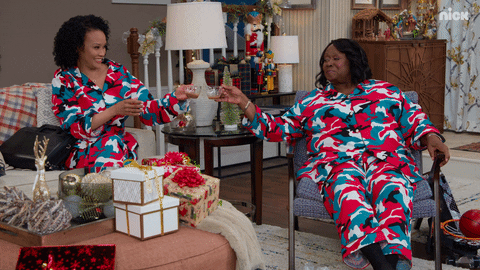 Giphy
Giphy
While I was doing some research on a totally different topic, I happened upon an article that talked about the psychology behind why we should be intentional about what we wear to bed. When you stop to think about the fact that (hopefully) you are sleeping somewhere between 6-8 hours every night, it would make sense that things like the color and fabric of your sleepwear would have a real impact on you — even subconsciously.
Well, when it comes to Christmas décor, specifically, not only does it take you back to nostalgic memories, it can also boost your moods. So, aside from being on-10 with your Christmas décor, also invest in some Christmas-themed PJs. Since you’re going to be doing a lot of lounging around (RIGHT?), do it in something that makes you think about all of your favorite things about this time of year.
3. Cop Some Christmas-Scented Candles
 Giphy
Giphy
There really is no telling how many articles that I’ve written where I am singing the praises of scented soy candles. Candles are soothing, comforting and a very easy way to reduce stress. Also, since it gets darker quicker and for a longer period of time around this time of the year, candles provide a relaxing vibe to your home. Since it is Christmastime, go with scents that are reminiscent of the season:
- Cinnamon
- Vanilla
- Cranberry
- Apple
- Pine
- Frankincense and Myrrh
- Peppermint
- Cashmere
- Ginger(bread)
- Orange
- Sugar Cookies
- Sandalwood
- Cloves
- Cedarwood
- (Hot) Chocolate
Personally, one of my favorite candle companies is Goose Creek. Their signature collections will have your entire house smelling like a high-end bakery. No exaggeration.
4. Play Some Winter-Themed ASMR Sounds
 Giphy
Giphy
I’m from Nebraska and my mother was a New Yorker. So, if there is one thing that I like, it’s seasons and that includes snow during wintertime. Unfortunately, Nashville is cray-cray when it comes to that. If, where you live, the weather is all over the place too (which is why I think it’s insane that some people still give pushback to global warming) and you would like for it to at least seem like you are in your own winter wonderland — invest in some fake snow to strategically place around your home.
Oh, and don’t forget to turn on some winter-themed ASMR sounds too. YouTube has videos that run for hours on end that feature blizzards and howling winds that really can make you feel like you are in the midst of an ice storm.
5. Host a Holiday Movie Marathon
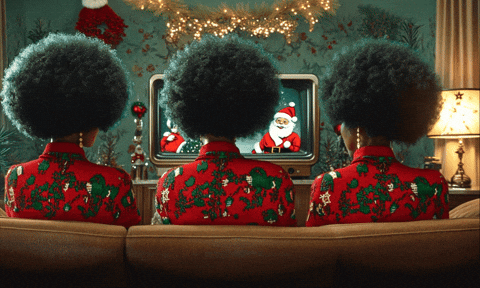 Giphy
Giphy
One thing to remember about a staycation is it doesn’t mean that you have to be alone or that the only people who can participate are the ones who live with you. Since a staycation is simply about staying close to home instead of traveling afar — absolutely consider having some of your favorite people over for a holiday-themed movie marathon. Shoot, Black America Web even did you a solid by publishing “25 Best Black Christmas Movies Of All Time;” plus, Tubi has a Black holiday hits section of indie films too.
Oh, and make sure to get creative with the Christmas-themed snacks. Some ideas? Some Kentucky-fried turkey tenders with cranberry hot sauce (recipe here), some Holiday Hot Spinach Dip (recipe here), some Grinch Kabobs (recipe here), some roasted pecans (recipe here) and some Pomegranate Guacamole (recipe here).
6. Spend a Night (or Two) at a Hotel or Vacation House
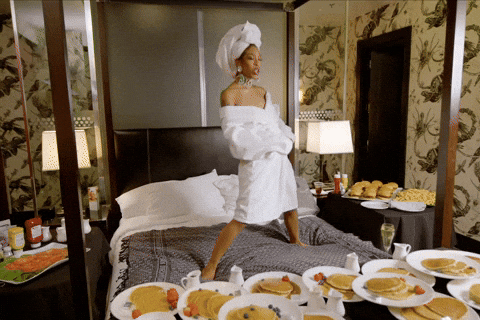 Giphy
Giphy
Just like you don’t have to be alone during a staycation, you also don’t have to be cooped up in your house the entire time. Get a change of scenery in your own city by spending the night in a hotel that you’ve always wanted to try out or renting a vacation house for you and some of your folks to hang out in during the time between Christmas and New Year’s Day. I have a “love little sister” who does this randomly when she needs a break from her work as a therapist. She says that it’s damn near like taking a trip (and she has PLENTY of passport stamps; trust me).
7. Have Brunch or Dinner at a Christmas-Themed Restaurant
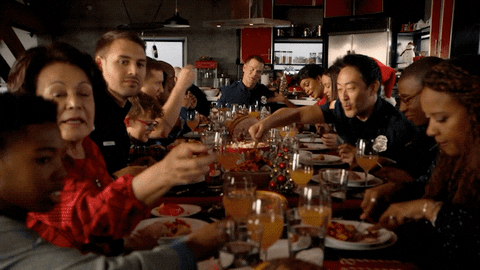 Giphy
Giphy
If nothing puts a bigger smile on your face than the thought of DoorDashing meals and barely even touching your stove during your staycation — hey, I am right there with you. Do consider going out to brunch or dinner during your chill time, though. It’s another way to bond with people and create some current holiday memories. And if you’ve got a bae and you opt for dinner, it can be a wonderful type of Christmas-themed date.
8. Go to a Holiday-Themed Concert
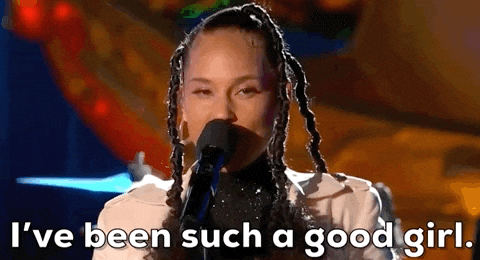 Giphy
Giphy
Being that I got my start as an entertainment writer, hear me when I say that I’m not someone who just has to go to a live concert every chance that I get. Oh, but baby, when I saw that El DeBarge was doing a City Winery tour and he was going to be here right before Christmas — I booked myself a ticket quick, fast and in a super-duper hurry! Shoot, I didn’t even want to go with someone because I plan to give him and that falsetto voice of his my complete and undivided attention. LOL.
I don’t know what it is about the holiday season that makes live music that much more enjoyable — but if there is a concert that features one of your favorite artists happening right through here, consider that to be a cool way to “tour your city” while cultivating a really awesome memory at the same time.
9. Also, Go Ice Skating
 Giphy
Giphy
One of my fondest memories of time with my father is going ice skating. We actually would do it in the summer (because that is when I would visit him) and, every year, he would get me a new ice skating outfit. Even now, when I watch someone ice skate (even in movies; like in the classic movie Garden State), I will have warm fuzzies.
Anyway, if you’ve never been before, go. If it’s been forever since you have, also go. There is something that is very sweet and so signature Christmas about it. Plus, it’s a top-tier form of exercise.
10. Take a Christmas Lights Tour
 Giphy
Giphy
Another one of my favorite Christmas memories is driving through neighborhoods and looking at the Christmas lights. And just like a Christmas concert can be a form of hometown touring, so can doing this if you decide to choose a couple of areas where you’ve never really been or rarely frequent.
Now are you excited about the thought of experiencing a holiday-themed staycation?
I thought you would be. ENJOY!
Featured image by Shutterstock










